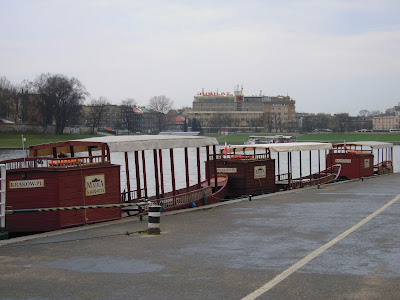I sit on the banks of the river and read my new book, the Bible, or as it is titled here, Pismo Święte, “Holy Writing” or “Holy Scripture.” Reading texts, the gist and the phrasings of which you already know reasonably well, strikes me as a good way to engage a foreign language, about the right mix of the familiar and the novel to make forward progress a little more likely. I have been struggling with Mickiewicz’s Dziady at least in part because of a complete ignorance of the myths and the story line. So I’ve rebegun my studies, flipping between Genesis and Ecclesiastes, my favorites, Rodzaj and Eklezjastesa, the first book remarkably appropriate for the season. “Let light appear,” God said, “Niech się stanie światło.” And day and night, waters and firmament, sun, moon, stars, plants in all their varieties, animals in all their varieties, and eventually people, in their somewhat rudimentary duality. Reading Rodzaj on the banks of the river at the foot of Wawel Castle after such a long winter, I sense, rather obviously, that God created the world in the spring. Such abundance. Such hope. Such letting be.
As something of a counterpoint to all that epic creation, I turn ahead to the old ecclesiast as well, “There is nothing new under the sun,” Nie ma nic nowego pod słoncem. The world had been around awhile by then, as had the ecclesiast, and the discontent of long winters had no doubt worn him down. (Be that as it may, I look about and see a lot of old things under the sun, many still worthy of attention, and a middle-aged thing or two.) But there are new things under the sun, or at least, newish kinds of things, like sunscreen, which I did not find in the drugstore. For the top of my head. You can find tanning emollients, that is to say, “vanities,” marności, among which the ecclesiast also counts wisdom, study, and books, “For study is a weariness to the flesh, and of the making of books, there is no end.” My very favorite observation on the nature of the professional world I inhabit. In Polish, że pisanie ksiąg to praca, która nie ma końca, a wytężone studia są umęczeniem dla ciała. It’s a profoundly beautiful lament, really.
And not untimely, because I was invited this week to attend a scholarly conference in Kraków on Ethnicity, Culture, and Politics. Scholars, I think, being a universal species, produce a similar kind of event, interesting and illuminating in places, puzzling (in the not good way) and contentious in others, and mostly agreeable in the before, the after and between the sessions, when we meet quite talented new people, not unlike what we think ourselves to be, who know different things and in talking, can save us some weariness of the flesh. But we all, publicly, profess a utility, a desire to be useful, to help, to be relevant, to contribute to the management of the world, or to its creative disruption, to the solution of social problems, to make it a better place, to give back. Forgive me some skepticism. The effort to know that derives from that busy impulse, and not from simple human curiosity, is to me the vanity of vanities, marność nad marnościami. The effort that derives from the simpler desire just to know is a more innocent vanity, a vanity, yes, but only of the first degree. Not that the knowledge and discoveries of interpretive scholarship don’t have their applications and uses, some even good, but they are applied and used by others for their own purposes, when not completely ignored. This desire to be useful I do not mock, but only caution as an invitation to an unnecessary sense of futility. We should study and write books and have conferences and teach not because of the grandiose good we might do—or the importance we might gain because of the grandiose good we might do—but because this is our special vanity, what we do as a created kind. We make meaning. (In fact, we can’t not.) And that is enough.
Earlier in my stay, on a wintry walk to Na Skałce, I discovered that the crypt holding the bones and ashes of some of Poland’s greatest literary figures was closed. On the way back to my mieszkanie I chanced upon these words written in the snow, vanitas ergo sum. In them I may have found my epitaph. For vanitas had replaced cogito with an ungrammatical but Ecclesiastically ironic insight.
This warm and sunny week the crypt was open, and for two and a half złoty and the removal of your czapek, you could pay your respects to Jan Długosz, Stanisław Wyśpianski, and Czesław Miłosz, which I have done. On Miłosz’s tomb are inscribed the words Dbałość o naukę jest miłość, “a solicitude for study is love.” Which is another way of saying the same thing, isn’t it? Whether written in stone or snow, studies are both love and a weariness to the flesh, a vanity, but they are our vanity, God-given.



